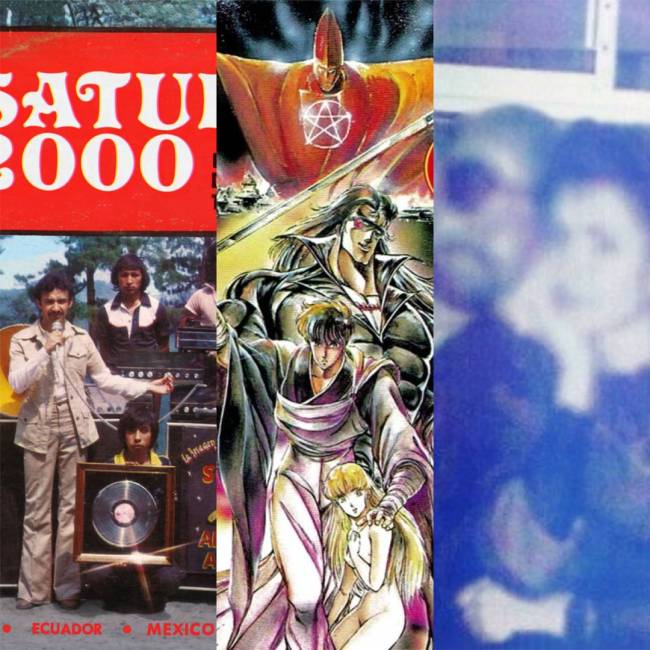Evan Nabavian’s YouTube algorithm is chaotic good.
“El Chacarero” (“The Farmer”) is hypnotic Peruvian psych. To be precise, it’s chicha, which emerged in the 60s when people migrated from Peru’s jungles and mountains to its cities where they mixed their traditional Andean huayno music with Colombian cumbia and newly imported American psychedelic guitar riffs. “El Chacarero” doesn’t mimic American rock, but rather refracts it through a prism to produce something homegrown and distinct. Its scuzzy guitar is American but its melody, rhythm, and percussion most definitely aren’t. “El Chacarero” has the immediate and jolting effect of putting you in another place.
It has several versions. Guitarist Marino Valencia recorded “El Chacarero” in 1968 or 1969 with El Gatos Blancos on the independent label Disco Ramirez. This one is raw and gritty. A compilation by the label Analog Africa from last year includes a slower version that is doubly disorienting – its languor makes it sound like it was remixed by DJ Screw. Valencia re-recorded “El Chacarero” with Los Diablos Rojos in 1971 for the label Sono Radio. It loses some of its bite, but it maintains its charms. Yet another iteration is a studio performance by Valencia that he posted on his Facebook page in 2021 where he is backed by a drum machine. In the description, he offers a modern reading of his cult hit from fifty years prior. The farmer represents the idyll of a hot dinner in a home full of laughter and love. This scene, he writes, has become increasingly foreign to people who eat their meals tethered to a screen. In the 21st century, Valencia’s psychedelic pastoral bristles at our fading humanity.
Yas-Kaz (Yasukazu Sato) is best known for his contributions to Japanese New Age music. He made his 1984 album Jomon-sho for a stage performance of an avant garde dance troupe in Paris; it’s full of chittering birds, chimes, and airy woodwinds. Such prestige fare makes it all the more weird that a few years later he made the soundtrack for Spirit Warrior: Festival of the Ogres Revival. This was an OVA (original video adaptation) – a straight-to-video movie – of a manga about a demon-hunting buddhist monk. The monk’s compatriots are a pyrokinetic teenage girl and a musclebound half-demon in Ray-Bans. It’s on YouTube if you need to satisfy your curiosity.
That small mountain of context is a distraction from “Ashura’s Theme.” The theme music for the aforementioned schoolgirl starts like a more typical Yas-Kaz record – oriental drums thrum without accompaniment for a full minute. Then, a rush of strings from frequent collaborators Stephanie Angel and Masatsugu Shinozaki announce heroic intent. “Ashura’s Theme” soars like a John Williams overture albeit with a fraction of the budget and a dull roar of traditional Japanese drums. Its theatricality punctures the ambient musician’s usual restraint with a sudden climactic flair. Yas-Kaz chose a schlocky cartoon as a venue to indulge in grandiose fantasies.
We’re accustomed to beats that pull from the farthest reaches of the musical canon. Accordions, sitars, and Redman adlibs have made their way into many a cherished loop. “Encored Dust” sounds like someone forced J Dilla to make a beat using the contents of a dumpster. Some of the discernable sounds are the jostling of broken glass, an unidentified squeak, and something heavy pounding on wood at regular intervals. The track comes from Anne Gillis of France and G.X. Jupitter-Larsen of Los Angeles, both sound musicians and performance artists who emerged in the 80s. Its first known pressing is a 7” from 2000 on the label Noisopoly. In 2021, it reappeared on a compilation of Gillis’ work by the label Art Into Life which dates the track to 1994 or 1995. Sample-based production is music as palimpsest. New music on top of old. “Encored Dust” is music born of urban detritus. It takes the world itself and chops it, loops it, and distorts it into a wordless communique from the mid-90s.


